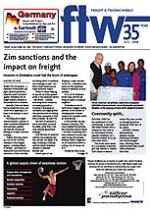WHEN THE G8 summit – a
collection of the world’s top
eight national economies –
raised the word “sanctions”
against Zimbabwe, the SA
freight industry shivered at
the possible loss of business.
But with China and Russia
having vetoed the move, and
South Africa opposing it, it’s
likely to be business as usual
for now.
Providing some insight,
Duncan Bonnett, a partner at
trade consultants Whitehouse
and Associates, pointed
out that the G8 was not
looking for a major economic
embargo.
“Rather, they have drawn
up a list of the 12 worst
offenders in the Mugabe
regime – including Robert
M himself – and intend to
impose full travel and financial
sanctions on them. And they
are talking about a mandatory
arms embargo as well – but
that in itself would have no
major economic impact.
“What it’s worth keeping
an eye out for is the general
public in the advanced nations
– like Britain – carefully
examining which companies
are supplying goods or
investing in businesses in
Zimbabwe, and slapping their
own personal bans on dealing
with those companies in their
home markets,” he told FTW.
This form of sanctions is
much more likely to prevail,
he added, rather than a fullscale
national government
embargo.
“And this type of consumer
activism can accelerate very
fast, and you can expect it to
keep increasing in intensity
until the whole Zimbabwe
situation is resolved,”
Bonnett said.
Warren Jayes of Leo
Shipping, a major operator
on the SA – Zimbabwe route,
points out the significant
impact of sanctions on local
business.
“A lot of SA businesses
would close, and the last
thing we need is a bankrupt
neighbour.
“Zimbabwe is one of
South Africa’s biggest trading
partners, so the amount of
unemployment it would
create in SA overnight would
be astronomical.”
At the moment, he says,
business is booming. “The
more troubled the economy,
the more they have to import
– and that’s everything from
basic foodstuffs to what they
need to keep the factories
working. There’s a huge spinoff
for South Africa which is
making a lot of money out
of it.”
Finding the forex to pay
for the goods is a hurdle
– with everything paid
upfront – but it’s a hurdle
that is generally overcome.
The biggest problem, says
Jayes, is duties which can
go up 200 to 300% in
a week.
Hazel Briggs of HB
Services agrees that
smaller companies would
lose out big time if
sanctions became a reality.
“People who have
kept their businesses
going in Zimbabwe have
done so under such dire
circumstances,” says Briggs.
“With the duties changing
every week, if goods are
delayed at the border it
creates huge problems
for importers.”
A recent shipment
was delayed at the border
because duty had not been
paid – and the problem
was that Zimra (Zimbabwe
Revenue Authority) would
not accept a cheque for
more than 20 trillion
Zimbabwe dollars!
Zim sanctions and the impact on freight
18 Jul 2008 - by Alan Peat
0 Comments
FTW - 18 Jul 08

18 Jul 2008
18 Jul 2008
18 Jul 2008
18 Jul 2008
18 Jul 2008
18 Jul 2008
18 Jul 2008
18 Jul 2008
18 Jul 2008
18 Jul 2008
Border Beat
Featured Jobs
New
New
